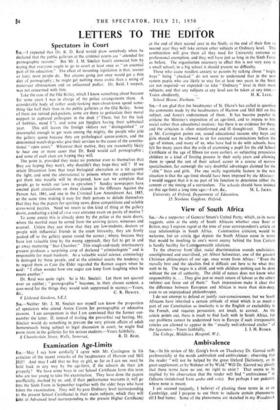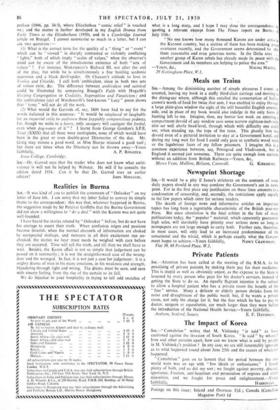Ambivalence
Sin,—In his review of Mr. Greig's book on Thackeray Dr. Garrod sniffs professorially at the words' ambivalent and ambivalence: observing that the reader " will not be helped by the great Oxford Dictionary, or its great supplement, or by Webster or by Wyld." Will Dr. Garrod say plainly that these terms have no use, no right to exist ? That seems to be implied by his observation that the reader will find "ambivalence" in Odhams (misderived from ambo and volo). But perhaps I see pedantrY where none is meant.
I am accused (unjustly, I believe) of planting these terms in or on Cambridge, and I propose to use them to indicate certain phenomena, till I find better. Some of the phenomena are sketched in my Woodstock
preface (1946, pp. 34-5), where Elizabethan " comic relief " is touched on ; and the matter is further developed in my English Drama from Early Times to the Elizabethans (1950), and in a Cambridge Journal article on Bruegel. I cannot summarise so much in a letter, but I can ask two questions:— (I) What is the correct term for the quality of a " thing " or " event" which can be " viewed" in sharply contrasted or violently conflicting lights," both of which imply " scales of values," when the observer's mind can be aware of the simultaneous existence of both "sets of values" ? For instance, Shakespeare's Richard III, not after the end of the play, but while he is simultaneously a fine bustling sardonic superman and a black devil-spider. Or Chaucer's attitude to love in Troilus and Criseide. I call both -ambivalent, since in both two sets of values exist, &c. The difference between ambivalent and satirical could be illustrated by comparing Bruegel's Faith with Hogarth's Sleeping Congregation or Credulity, Superstition and Fanaticism ; and the ambivalence (sic) of Wordsworth's best-known " Lucy" poem shows that irony" will not do all the work.
(2) What would the Garrods of, say, 1600 have had to say for the words italicised in this sentence: "It would be misplaced or laughable for an impartial critic to outfrown these foppishly compunctious pedants, for, though we write in a hurry, only savagery will castigate the fretful, even when dog-weary of it " ? I learnt from George Gordon's S.P.E. Tract (XXIX) that all these were neologisms, none of which would have been in the great or even double-great Dixonaries of the day. Mr. Greig may misuse a good word, as Miss Sharpe misused a good tool ; but there are times when the Dixonary can be thrown away.—Yours



































 Previous page
Previous page